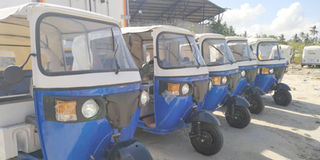Prime
Going digital: Why switching to electric-mobility is crucial

Some of the TRi electric three-wheelers that have been introduced in the Dar es Salaam market as the government creates a conducive environment for investment. The e-mobility company expects to produce over 200 passenger tricycles, famously known as Bajaji. PHOTO | Beatrice Materu
What you need to know:
- E-mobility companies are working to transform the transportation sector through clean mobility with sustainable and affordable solutions
Dar es Salaam. I was riding in a three-wheeler in the crowded metropolis of Dar es Salaam one afternoon when I noticed how eerily quiet the Bajaji that was carrying three people from Kimara to Mwenge was.
No usual loud and irritating engine sound, no struggling to start the trike, and no polluting fossil emissions either!
I couldn't help but take note of the manner in which Abdallah Lwenno manoeuvred the trike across the city.
I was impressed! I asked him what was different about his white and blue-coloured tricycle.
“It’s an e-vehicle,” he responded politely. “I don’t have to buy fuel or stop at a petrol station at any point. I am making a slightly higher amount of money than before, which is good for me,” he added.
Mr Lwenno shared that his Bajaji goes three times the distance it used to go when using fuel.
“I use Sh3,000 to charge the batteries, enabling me to travel over 100 kilometres as compared to Sh3000 fuel that took me only 30 kilometres,” he said.
“It is easy to operate, even using one hand, which is difficult for a fuel-powered Bajaji," added Mr Lwenno.
It is indisputable that Bodaboda and Bajaji taxis make up an important part of public transportation systems in East Africa as well as providing means of livelihood for many people, particularly the youth.
They play an integral role in the movement of goods and people in cities and towns that are facing increasing challenges of traffic congestion, as well as in remote parts of the country.
However, increasing fuel prices have forced people to dig deeper into their pockets to power their rickshaws and bikes.
"I used to spend Sh15,000 to Sh20,000 for fuel per day in order to generate Sh60,000 by the end of the day. But with an e-mobile, I will be able to generate Sh100,000 per day from the Sh3,000 required for battery recharges that last for two days, which is a huge relief to me," says Mr Keffa Joseph, a Bajaji driver stationed at Buguruni.
A number of e-mobility companies are working to transform the country’s transportation sector through clean mobility with sustainable, affordable, and efficient solutions powered by electric micro-mobility.
Some of these e-mobility firms provide eco-friendly and cost-saving services to two- and three-wheeler riders operating in cities such as Dar es Salaam and Arusha.
An entrepreneur, Ms Mercy Kitomari, said during an interview that she sees huge potential for e-mobility in the country.
She shared that challenges such as high fuel and maintenance costs will soon be a thing of the past, noting that the major advantage of e-mobility over gasoline-guzzling variants was the comparatively low cost of operations.
“Someone had to wake up others; electric Bajajis will benefit not only drivers but also the government itself,” she said.
TRi, E-Mobility, and others saw an opportunity to empower young Tanzanians by improving their livelihoods and conserving the environment at the same time, according to Ms Kitomari.
She said e-mobility is cost-effective and empowers young people.
“Charging a Bajaji or Bodaboda is cheaper than buying petrol or diesel. With electricity, the expenses of two- or three-wheelers are cut down to almost 70 percent as compared to fuel-powered vehicles,” she says.
The growing number, environmental concerns and their vital role in the industry will enable Tanzania to make adjustments to have environmentally friendly e-vehicles running the public transportation system.
E-vehicles offer a number of benefits over traditional fuel-powered vehicles in the areas of environmental friendliness, ease of maneuverability, and affordability.
However, the e-mobility industry faces several drawbacks that need to be improved.
Data from the National Bureau of Statistics (NBS) shows that Bajajis and Bodabodas constitute two-thirds of all vehicles plying on the road and that the number is still growing.
The recent government’s move to exempt excise duty that was charged for electric non-utility vehicles with only electric motors was greatly welcomed as the country’s e-mobility market is gaining momentum.
Tabling the 2023/24 budget, Finance Minister Mwigulu Nchemba said the government intends to improve the country’s investment climate while maximising the use of electricity and natural gas in vehicles.
He said the move will enable government to suspend fuel importation and utilise foreign reserves for other development activities.
“For the purpose of enhancing policy stability and improving investment climate, I propose amendment of the Excise (Management 99 and Tariff) Act, CAP 147, to exempt excise duty charged based on engine capacity on electric non-utility vehicles with only electric motors along with Compressed Natural Gas (CNG) vehicles,” he told the Budget House, noting that the move will reduce the country’s dependence on petrol and diesel.
“The measure intends to enhance the use of electricity and natural gas, whose abundance in the country is extremely high. The country will in turn save foreign currencies used for fuel importation,” he added.
Energy minister January Makamba has been insisting on the use of other sources of energy in order to meet their demand.
“The government will continue to encourage the use of Compressed Natural Gas (CNG) and electricity in powering vehicles and collaborate with stakeholders interested in investing in hydrocarbon reductions,” he said.
He said the ministry will strengthen the use of clean energy for domestic purposes to ensure 80 percent of citizens use clean energy by 2033.
The Tanzania Revenue Authority provides zero excise duty to motor vehicles with less than 1,000cc cylinders, five percent to those with 1,000cc cylinders but not exceeding 2,000cc cylinders, and 10 percent to those exceeding 2,000cc.
Also, imported second-hand motor vehicles are charged 15 percent extra for used vehicles, excluding agricultural tractors aged eight years but not exceeding 10 years.
At least 20 percent is charged for used motor vehicles exceeding 10 years from the year of manufacture, while used spare parts for motor vehicles and motorcycles are charged 25 percent more.
The recent advancement favours manufacturers of battery swap stations for electric motorcycles as well as investors in the infrastructure for EV charging.
Despite these efforts, drivers are of the view that there are several issues that need to be addressed for a successful e-mobility transformation.
Mr Lwenno says more batterycharging and swapping stations should be introduced in the country, detailing that fuel-powered vehicles are favoured by the presence of enough petrol filling stations.
“The amount of power remaining in the battery will greatly determine the distance at which the vehicle will travel. Several hours have to be spared for the battery to be charged, something that could irk prospective clients,” says Mr Lwenno.
He says motorcycle and rickshaw costs remain the most expensive, and that the battery continues to be owned by the company. According to him, it is the company that has the responsibility to recharge the battery and ultimately charge the driver a reasonable amount of money.
Based on the current interest from the general public, Mr Lwenno opines that the government and private investors should consider completely switching to e-mobility, insisting that it is a positive move to make.



